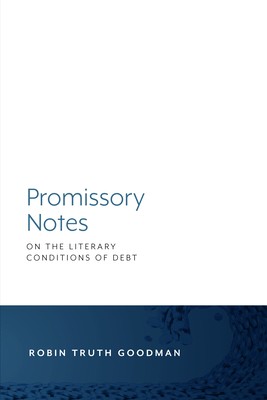
- We will send in 10–14 business days.
- Author: Robin Truth Goodman
- Publisher: Lever Press
- ISBN-10: 1643150006
- ISBN-13: 9781643150000
- Format: 15.2 x 22.9 x 0.7 cm, minkšti viršeliai
- Language: English
- SAVE -10% with code: EXTRA
Reviews
Description
There is no doubt that the beginning of the twenty-first century was marked by crises of debt. Less well known is that literature played a historical role in defining and teaching debt to the public. Promissory Notes: On the Literary Conditions of Debt addresses how neoliberal finance has depended upon a historical linking of geopolitical inequality and financial representation that positions the so-called "Third World" as negative value, or debt. Starting with an analysis of Anthony Trollope's novel, The Eustace Diamonds, Goodman shows how colonized spaces came to inhabit this negative value. Promissory Notes argues that the twentieth-century continues to apply literary innovations in character, subjectivity, temporal and spatial representation to construct debt as the negative creation of value not only in reference to objects, but also houses, credit cards, students, and, in particular, "Third World" geographies, often leading to crisis. Yet, late twentieth century and early twenty-first literary texts, such as Soyinka's The Road and Ngugi's Wizard of the Crow, address the negative space of the indebted world also as a critique of the financial take-over of the postcolonial developmental state. Looking to situations like the Puerto Rican debt crisis, Goodman demonstrates how financial discourse is articulated through social inequalities and how literature can both expose and contest the imposition of a morality of debt as a mode of anti-democratic control.
- Author: Robin Truth Goodman
- Publisher: Lever Press
- ISBN-10: 1643150006
- ISBN-13: 9781643150000
- Format: 15.2 x 22.9 x 0.7 cm, minkšti viršeliai
- Language: English English
There is no doubt that the beginning of the twenty-first century was marked by crises of debt. Less well known is that literature played a historical role in defining and teaching debt to the public. Promissory Notes: On the Literary Conditions of Debt addresses how neoliberal finance has depended upon a historical linking of geopolitical inequality and financial representation that positions the so-called "Third World" as negative value, or debt. Starting with an analysis of Anthony Trollope's novel, The Eustace Diamonds, Goodman shows how colonized spaces came to inhabit this negative value. Promissory Notes argues that the twentieth-century continues to apply literary innovations in character, subjectivity, temporal and spatial representation to construct debt as the negative creation of value not only in reference to objects, but also houses, credit cards, students, and, in particular, "Third World" geographies, often leading to crisis. Yet, late twentieth century and early twenty-first literary texts, such as Soyinka's The Road and Ngugi's Wizard of the Crow, address the negative space of the indebted world also as a critique of the financial take-over of the postcolonial developmental state. Looking to situations like the Puerto Rican debt crisis, Goodman demonstrates how financial discourse is articulated through social inequalities and how literature can both expose and contest the imposition of a morality of debt as a mode of anti-democratic control.


Reviews